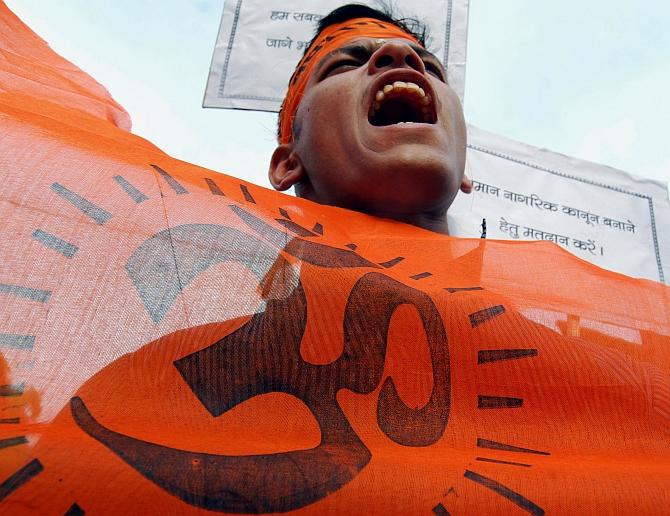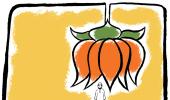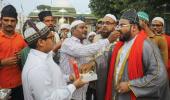India's majoritarian regime is now making a dangerously fast-paced move towards theocracy, like its western counterpart did a few decades ago, warns Mohammad Sajjad.

With each passing day, a growing number of Hindus in India seems to be fixated on imitating Pakistan's descent into self-destructive majoritarianism.
A growing number of Hindus seem to be acquiescing in India's move towards a Hindu Rashtra.
The National Register of Citizens and the faith-based Citizenship (Amendment) Act 2019 suggest this.
It therefore becomes instructive for us Indians to have a quick look at the precipice of disaster that Pakistan perches on, in its rulers's quest for what they preferred to call Nizam-e-Mustafa (system of Prophet Mohammed, rule by Shariah).
Apparently, Pakistan now seems to struggling hard to get out of the misadventure of theocracy.
But it is no easy task for them.
Dismounting the tiger is never an easy task.
This is where we Indians need to become extremely cautious.
Despite being a student of modern Indian history and having worked on the history of India's Partition, my interest in the internal affairs of Pakistan has thus far been minimal.
A possible reason for this was the way we have been taught the modern history of nation-making in the South Asian region.
Pakistan came into existence with a congenital misconception of nationhood.
Hence, it was destined to remain unstable.
Though its founder M A Jinnah is said to have tried to introduce a concept of citizenship which was less retrogressive than his strident communitarian separatism of 1938-1947.
Destined as it was to have failed (also because he passed away, within a year of Pakistan's formation), the 1956 constitution that Pakistan framed was neither secular nor theocratic.
Then, General Ayub Khan in 1958 introduced 'limited secularism with State intrusion into civil lives'.
In July 1961, he also introduced gender reforms in Shariah in and reformed family laws to undermine the Ulema's obscurantism and to reduce the influence of Pirs who, according to the Pakistani historian K K Aziz (1927-2009), were 'patron-saints of the Muslim League and had developed a mastery of intrigue and proficiency in political cut and thrust, and had grown new tentacles by matrimonial networks into industrial and military families' (vide his 2001 book Religion, Land and Politics in Pakistan: a Study of Piri Muridi).
Here, we, Indians should be reminded of the growing influence of Sadhus in India's politics, more manifestly through the BJP and its affiliates.
Zulfiqar Ali Bhutto's predecessor Yahya Khan (1914-1980) was the first head of State in Pakistan to seek the support of Islamic fundamentalists.
This association between the military and the Islamists yielded many adverse results for Pakistan.
It stoked Bengali self-determination, and created Bangladesh.
Bhutto's aggressively imperialistic designs resorted to 'police action' from March 25, 1971.
Sheikh Mujibur Rahman was arrested, and a massacre of Dhaka university students, teachers and other educated professionals began.
The horrors of rape and killings by the Pakistan army came to be catalogued in the Mahmudur Rahman Commission Report, which was made public much later.
Bhutto's socialism tinged with Islam and the policy of pacifying Islamists gave way to a Zia kind of regressive regime.
This had also to do with the fear of India which had aided in dismembering Pakistan in 1971.
Pakistan's shaken self-esteem had to be restored.
Therefore, by 1977, Bhutto made Sharia law supreme by prohibiting liquor, dancing and gambling.
His successor, Zia-ul Haq, moved ahead, further tightening blasphemy laws to subject its minorities (Ahmadias, Shias, Christians, etc) to greater persecution.
One of the best accounts articulating all these is an Urdu memoir by Ali Amjad, Shaakh-e-Nihaal-e-Gham: Ek Afsana-e-Hayat (2006).
A whole-time party worker of the Communist Party of India, he had migrated to Pakistan in 1968 after he was chastised and harassed by the Indian government for his role in the Left-inspired labour movements in Jamshedpur.
Before this, he also published a labour history and an Urdu novel, Kali Mati (1999), on the labour movement and communal violence of Jamshedpur of March 1964.
Amjad's elder sister Zahra Daudi and his elder brother Ali Ashraf were enlightened Communist activists.
In extremely lucid prose, and with an amazing economy of words, in just about 10 pages, Amjad recalls Pakistan's degeneration into right-wing majoritarianism, its search for minorities among Muslims, to subject them to horrific persecutions and in their quest of Nizam-e-Mustafa, they inevitably pushed their bright, promising youths into the abyss of suicide squads, all in the name of religion.
Amjad writes that Bhutto resorted to massive poll rigging in the 1977 elections.
His regime was tyrannical and repressive against dissent and political opposition.
Scores of politicians were jailed, opponents were tortured.
Bhutto had given up on basic issues of roti (food), kapda (clothing), makaan (housing), sehat (healthcare) and resorted to appealing to religious sentiments.
And that was his eventual undoing.
He was out-bid by his Opposition and outdone by his successor with the highest possible dose of Islamism and majoritarianism.
Bhutto's opposition built up on the slogan, Nizam-e-Mustafa, a movement akin to the politically motivated Ram Rajya rhetoric of the saffron forces of India since the 1980s.
The protagonists of Nizam-e-Mustafa had nothing to explain about its details, except repeating that the Quran will be implemented.
Supporters of Bhutto were dismissive about the Nizam-e-Mustafa movement and attributed it to US conspiracy led by its then secretary of state Henry Kissinger.
Even a pro-democracy leader, Wali Khan (1917-2006), son of the Frontier Gandhi Khan Abdul Ghaffar Khan (1890-1988), incited the military against Bhutto.
Having faced military reverses in 1971, and losing out its eastern, Bengali-speaking territory, the Pakistan military had kind of assuaged its credibility by repressing the Balochis.
General Zia instrumentalised Islam also in the domains of law and education, in order to legitimise his tyrannical, discriminatory rule.
The Jamaat-e-Islami was in alliance.
The judiciary had turned submissive to the Zia regime.
The Lahore high court got a pliant Maulvi Mushtaq as chief justice to penalise Bhutto. About which Amjad makes a sharp jibe, 'Accusations against Bhutto were right. Cases against him were false'. Bhutto was hanged in 1979.
Zia then declared that he was accountable only to Allah, and not to his people on earth.
To cover up all his tyranny and failures, he brought out a series of 'Islamic' ordinances: Zakat ordinance, Salaat committees to persuade people to offer prayers in mosques, Zohar (noon) prayers in government offices, Shariah-based penalties for many crimes, interest-free Islamic banking, Islamic rules for witnesses, etc.
Zia got 'pracharaks' free of cost from the prayer leaders, Pesh Imams and muezzins who were earlier given salaries through waqf assets by the Bhutto regime.
Bhutto had also resorted to liquor prohibition and Friday as weekly holidays.
This didn't work much for him in winning over the religious opposition though.
Surprisingly, Zia didn't touch family laws and income tax laws.
The family laws were already reformed by Ayub Khan in July 1961, something which the Indian Muslim clergy kept opposing as late as 1986 and a section of them stick to such gender injustice till date.
Rather, Zia continued with these: Restrictions on polygamy, extensions in women's right to take divorce (khula), right of inheritance to orphan grandsons in the property of grandfathers.
These reforms by Bhutto had faced opposition from the mullahs.
Even a relatively progressive Wali Khan tried to derive cynical political benefits out of the resistance to reforms.
Bhutto had tried to disarm the opposition by pitting adversities against the Ahmadis (Qadianis), the followers of Ghulam Ahmad of Qadian (1835-1915).
In persecuting the Ahmadis, Zia went a few steps ahead.
They could now attract punishment even if they printed Bismillah (In the name of Allah) on their marriage invitations and also if they recited the Kalma (vow for monotheism).
Separate electorate for non-Muslims was also brought in, to keep them as segregated as ever in Pakistan.
Thus Zia enforced an 'Islamic regime', and this is how he silenced all questions against him.
'The fatwa-selling Moulvis are anyway centres of religious extremism and once such a moulvi becomes a martial law administrator, then the regime becomes a terror for its own people', remarks Ali Amjad, taking a dig at Zia.
A better expose and critique of the persona and the retrogressive politics of Zia is depicted brilliantly in Mohammad Hanif's remarkable 2009 novel, A Case of Exploding Mangoes.
The political and social life of Pakistan under Zia, after Bhutto's execution, passed through great indignation and ruination.
A long dark night of superstition, jihalat, irrationality, bigotry, fell on Pakistan, says Amjad, and then under US patronage, global jihad against the Soviet army in Afghanistan between 1979 and 1989.
As a consequence, Pakistan witnessed a massive influx of dollars and firearms.
The US war against the Communists in Afghanistan radicalised Pakistan.
Zia was just a tool, a pawn.
Saudi Arabia, Algeria and other West Asian regimes provided as many as 25,000 troops to this pursuit.
Zia implemented 'Islami Nizam' with even greater vigour.
'Shia Kafir, Wajibul Qatl (Shias are disbelievers and can be killed)' kind of graffiti appeared across Pakistan throughout the 1980s and 1990s.
Masjids, Imambaras, graveyards, planes all began to witness sectarian pogroms: Opening fire on people offering prayers became all too frequent.
The Muslim youth, who should have become educated professionals, were turned into violently mad jihadis.
Yet, nobody made a serious, comprehensive in-depth diagnosis of all these menace.
Only a foreign conspiracy was reiterated and offered as a scapegoat.
Many denied the radicalisation and majoritarianism of Pakistan's Muslim youth.
At the most, a moral lesson of amity was occasionally repeated as hollow rituals.
Amjad, then, describes some instances when the judiciary remained pathetically embedded with the Islamist State.
This is something we can see in India today.
'The new nation [Pakistan] was born with an image of India as a villain, a satan, and a monster next door, out to devour the newborn state', wrote M Waseem, in his 1994 book, Politics and the State in Pakistan. In this hate-filled definition of 'nationalism', Pakistan has ruined itself by turning into a theocratic State.
India's majoritarian regime is now making a dangerously fast-paced move towards theocracy.
Are we Indians in general, and Hindi-belt Hindus in particular, really awake to the alarm and prepared to rise to the occasion, before more and more of our youth, protagonists of a Hindu Rashtra, turn into hot-headed lynchers persecuting heterogeneous minorities within and beyond the fold of Hinduism?
Professor Mohammad Sajjad teaches history at the Centre of Advanced Study in History, Aligarh Muslim University. He can be contacted at news@rediff.co.in










